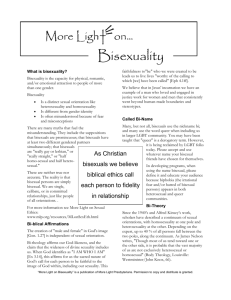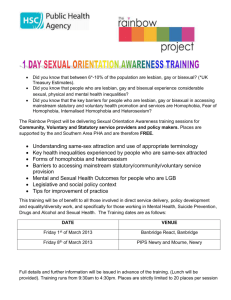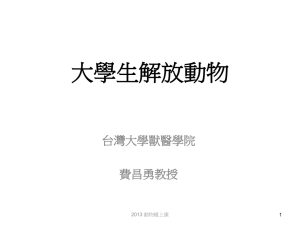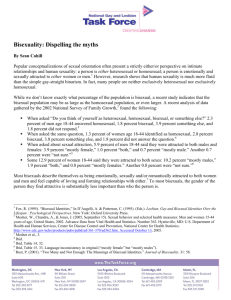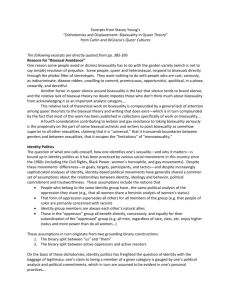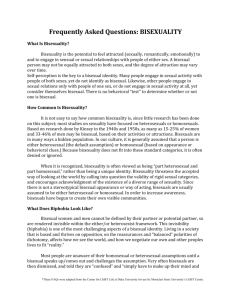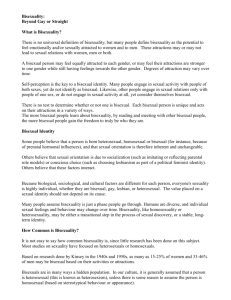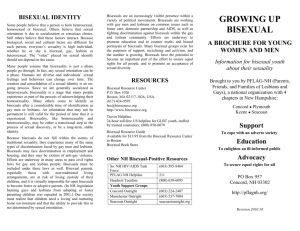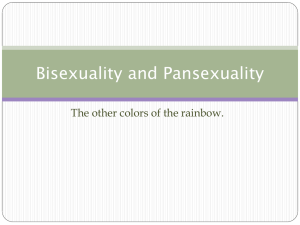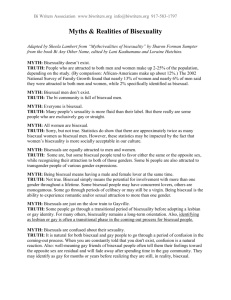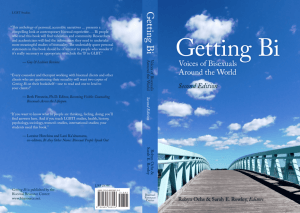Bisexuality and Mental Health
advertisement
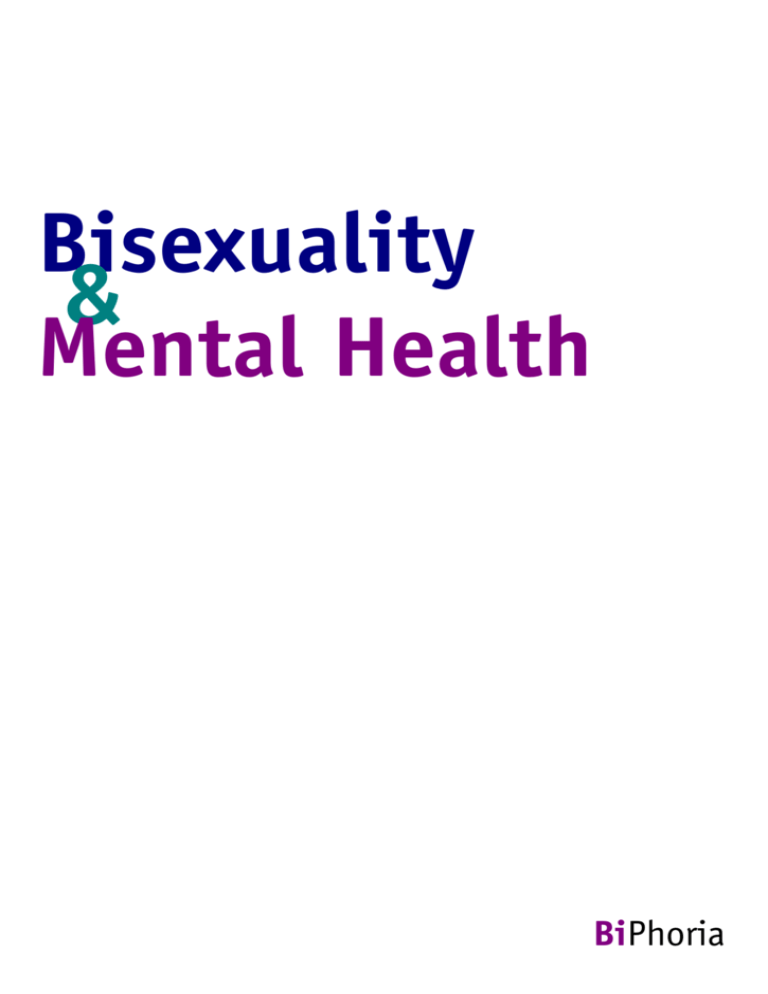
Bisexuality & Mental Health BiPhoria "I went to a sexual health clinic for a routine STD screening. I'm female but when it emerged I was sleeping with a bisexual, I was told I had to go to the gay and bisexual men's clinic to receive my testing. It was only when I mentioned that my bisexual partners were female that they agreed to treat me in the female clinic. I would not have felt comfortable going to the men's clinic and felt quite uncomfortable about being tested at all after that." "When I went for initial interview to get referred to a gender identity clinic, they told me I needed to stabilise my sexuality before they would engage with me about my gender dysphoria." "When I told my therapist that I was bisexual and that I was having trouble finding a place in society where I fit in, he assumed I wanted help to become straight. He referred me for CBT to 'cure' me. I didn't feel any more confident about my sexuality." "A psychiatric nurse asked me what I'd done at the weekend and I mentioned I'd been at a bisexual event, and as a result came out as bisexual. He seemed fine at the time but when it came to see my counsellor, I found out that my referral letter said that I had unresolved issues with my sexuality. I hadn't said anything like that! I felt so betrayed, knowing that he'd secretly been judging me like that." Published by BiPhoria © 2011 www.biphoria.org.uk May be reproduced with credit to BiPhoria and our web address. Contact: bis@biphoria.org.uk or Box 101, LGF, 5 Richmond St, Manchester M1 3HF Bisexuals may experience homophobia like lesbian and gay people, as they might appear lesbian or gay. But there are some issues that are unique to the bisexual experience, which is the focus here. What is Bisexuality? Definition from the Bisexual Index (www.bisexualindex.org.uk): “A bisexual is someone who is attracted to more than one gender.” Some people self-identify as bisexual. Others may use other terms such as queer, pansexual, bi-curious, questioning, mostly straight, heteroflexible or many more. Some people may be behaviourally bisexual. They may identify as gay or lesbian but have relationships with people of different genders or identify as straight but have relationships with people of the same gender. Labels are not as important as making sure people have access to the services and support they need. Bisexual people may: · Be equally attracted to people of all genders, be mainly attracted to people of one gender or consider gender irrelevant. · Find their level of attraction to different genders varies over time or remains constant through their life. · Have relationships with people of the same gender or different genders. · Be celibate, monogamous, cheating, or in polyamorous relationships (Polyamory is having more than one relationship at a time with the knowledge and consent of everyone involved.) · Be of any age, ethnic background, religion, disability, or other things besides their sexuality about which they may also experience discrimination and/or mental health issues · Be transgender or genderqueer and/or have transgender or genderqueer partners. (Transgender means having a gender identity different from the gender assigned at birth. Genderqueer means identifying as a gender other than male or female, especially in ways that challenge assumptions about gender.) · Be connected to "straight" or LGBT community, both or neither. Biphobia As well as homophobia, bisesuals may experience biphobia, which comes from prejudices and stereotypes about bisexual people and may result in discrimination, harassment or violence. Stereotypes of Bisexuals Some examples of stereotypes we have heard or experienced: · Greedy · Promiscuous · Deceitful/Untrustworthy · Can’t commit to one person · Cheater · It’s a phase before coming out “properly”. · Experimenting before settling down in a heterosexual relationship. · Attention seeking / just doing it for their boyfriend · Indecisive · It’s easier to be bi – you can pass for straight if you want to. · Cowardly · Fooling themselves · Sexually predatory / Vector for STDs · Irresponsible · Bisexual men don’t exist! · Kinky / Sexually experimental · Young / Immature As with any stereotypes, some of these may be true in some individuals – being part of a stereotyped group is no guarantee against the stereotypical behaviour! – but the stereotypes are still spurious and potentially damaging. Where Does Biphobia Come From? · From straight people and mainstream culture, including friends, family and partners. · From other LGBT people, friends, family and partners. · Institutional biphobia – at work, from health and social services, from government agencies and other institutions. · Internalised biphobia. Four ways you can help make services accessible/supportive to bisexuals 1. Be aware of the stereotypes you and other members of staff may have. 2. Be aware of the effects of biphobia · Be aware that health professionals have a lot of power over their service users, which means the stereotypes they hold can have a very negative impact on the lives of vulnerable people. · Discrimination, harassment and hatecrimes at home, at work or in public spaces can have a huge affect on mental health. · Be aware how stereotypes can affect people’s diagnosis and treatment – for example if someone is assumed to be ‘confused’ about their sexuality, will it be assumed they are confused in other areas? · Be proactive in challenging biphobic behaviour from both staff and other service users. Be aware biphobia may come from lesbian and gay as well as straight staff and service users. · Internalised biphobia may make people deny their feelings, feel pressured to “choose”, or be defensive. They may feel expected to live out the stereotypes discussed above. · People may feel unable to come out to their partners, friends or family, leading to the stress and anxiety of keeping secrets from loved ones. Social spaces tend to be either straight or gay. If your partner is the ‘wrong’ gender for your social space, this can lead to conflict and isolation. 3. Make services as inclusive as possible · The fear of being excluded or discriminated against may discourage bisexuals from accessing services or being open with health professionals. · Bisexuals may have experienced exclusion in services for lesbian and gay people. Make it explicitly clear that bisexuals are welcome to use LGBT services. · Equally, bisexuals may not be connected to the LGBT community – targeting services for bisexual people only through LGBT organisations will miss out a lot of people (only one-third of bisexuals access the 'LGBT scene' regularly, and of course that doesn't count all those we don't know about or who won't say!). People may identify as lesbian, gay or straight, but be · behaviourally bisexual. Don’t assume you know all about someone’s sexual behaviour from their identity, current partner, etc. 4. Be open to learning more · Like homosexuality, there are a lot of weird psychological theories about bisexuality. Bisexuals are the experts on their own lives and experiences. · Don’t assume open or polyamorous relationships are harmful or involve deceit. (But don’t assume all bisexuals are polyamorous or cheating). Engage with the bisexual and LGBT community, and by using resources such as this one! Bisexuality and Mental Health: Research There is limited research available about bisexual people’s mental health (often LGB is all mixed together in the statistics, and information is often solicited via LGBT organisations so misses out at least 2/3 of bisexuals who don't interac t with the 'scene') but the available research shows: Bisexual people are less likely than lesbians and gay men to report that their siblings have been positive about their sexuality. They are also less likely to be at ease with their sexuality or to have come out to family, friend s and 1 colleagues. Bisexuals are less likely to feel comfortable being out at work than lesbians or gay men and less likely feel workplace LGBT networks were helpful.2 1 in 5 LGBT people have experienced homophobic, biphobic or transphobic hate crimes in the last 5 years.3 LGBT people, especially young people, are disproportionately likely homeless or insecurely housed.3 to be Bisexual people report poorer mental health than either heterosexuals or lesbians and gay men, higher levels of anxiety and depression, more current adverse events and a higher frequency of financial problems.4 · Bisexual Resources · BiPhoria (www.biphoria.org.uk) – Manchester based bisexual social and support group. · Both Directions – Booklet providing information about being out as bisexual in the UK, available for download from the Bi · Bisexual Index (www.bisexualindex.org.uk) – Community News website. Organisation and website which seeks to challenge myths about bisexuality and bisexual · BiCon (www.bicon.org.uk)– the UK Bisexual Conference/Convention – Annual invisibility. community event over 4 days consisting of · Bi Community News workshops, discussions, meetings and social (www.bicommunitynews.co.uk) Britain's biggest events with bisexuals and allies from around selling bisexual magazine, giving a voice to the UK, Europe and the world. Running since the bi community since 1995. 1984. References to Research on Mental Health 1. King, M and McKeown, E (2003) Mental Health and Social Wellbeing of Gay Men, Lesbians and Bisexuals in England and Wales: A summary of findings, Mind, London. 2. Bisexual People In The Workplace - Practical advice for employers, Stonewall, London 3. A Five Year Strategy underpinning the development of the LGB&T Sector in the North West (2009 2014), Lesbian and Gay Foundation, Manchester 4. Dobinson, C, MacDonnell, J, Hampson, E et al. (2003) Improving the Access and Quality of Public Health Services for Bisexuals, Ontario Public Health Association, Toronto.
